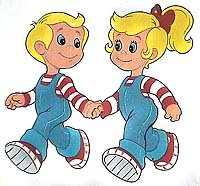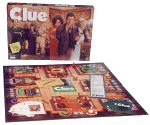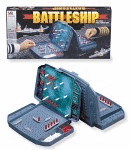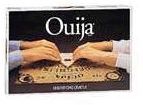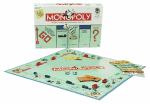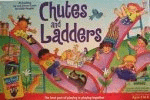|
Before entertainment was invented in the early '90s, people used to invest a lot of their free time in playing board games. This entailed using dice, cards and spinners to command bizarrely-shaped game pieces around colorful game boards hundreds upon hundreds of times, until one of the players was considered the winner, and therefore cheater, of the group. In addition to teaching children the bitter sting of defeat and the wonderful highs of informal gambling, board games also taught them that arbitrary regulation was more relevant than logic and reason. Here are ten board games you've probably played before: Candy Land According to the instruction manual, “Something wonderful has happened in Candy Land! Very special friends now live in such favorite places as the Peanut Brittle House, the Gumdrop Mountains, the Molasses Swamp and other sweet spots.” I thought, “Oh, how fantastic. I’m so glad that a bunch of retards are now living in Candy Land.” Then I realized that I was actually consulting the instruction manual to learn how to play Candy Land, which made me a bigger retard than any of them Candy Land was a simple concept. All you had to do was pick a card and then move your gingerbread man to the color it indicated. Eventually you reached Candy Castle, which is pretty anticlimactic when you take into account the fact that the entire rest of the game board is directly related to candy. It was kind of like, “Oh, well that’s great, a castle made of candy. I’m just relieved I spent the last twenty minutes of my life navigating through a world filled with candy to reach additional candy. I could really use some candy after that.” The equivalent of this would be attempting one of those life-size corn mazes you sometimes see off the highway, and all you get for completing it is an ear of corn. I tried playing this game last year with some friends, but we realized quickly on that it wasn’t quite as fun as we remembered. Then we got creative and changed the game to “Brandy Land,” and suddenly it was OK after all.
Clue
Like any good educational game, this one starts with the premise that there’s been a terrible murder. To win Clue, you must make a correct accusation of the murderer, the weapon used, and the room in which it took place. If your accusation is incorrect, you lose the game and don't get to play anymore. That rule is the most important clue of all: it meant that if you were bored, you could simply make a random accusation and quit playing this crappy game. The fact is, Clue drags on too long. You’d think that once the police had discovered the murderer, they would be content. No so in this game. The forensic analysts working at Hasbro figured that establishing the room in which the crime occurred was just as important as finding out who actually committed the murder, as if there were a unique set of bylaws in the conservatory. I say, just prosecute the bastard. And on another topic, you can’t kill somebody with a candlestick--it’s impossible. If my Christmas Party of 2002 has proven anything, it’s proven that. Sorry!
The reason it's called Sorry! is because when the guy who thought of it presented the idea to Parker Brothers, he was trying to apologize for thinking up with such a horrible game. "OK, here's my game. Sorry, I know, this game sucks. If you want to fire me, I understand.” This game is not only bad, I even think it’s partially responsible for the fact that the word it’s named after has had all its sincerity leached out of it. When you’re playing the game and say “Sorry!” everybody knows you’re not really sorry—you’re just happy you sent somebody back to start and want to rub in with your smarmy little nasally, drawn-out tone. “Sorrrrr-yyyy!” These days, it’s always insincere when somebody says sorry in real life—it’s what a bank teller says after informing you that you’ve been charged a fee you didn’t know existed. The bank teller clearly doesn’t care, so she says “Sorrr-yyy!” and it’s all you can do not to punch her right in the face. Risk
I propose that there is no difference between the object of Risk and the intentions of Hitler. In this violent dystopian vision, your object is to eliminate all the other ethnicities in the world through warfare. Because the rules are so complex compared with games such as Candy Land, I’ve only played it a few times and frankly I don’t even remember how to play. After rechecking the rules, however, I’m pretty sure that the only thing you stand to risk by playing this game is about an hour of your time. Battleship
Famous for the ubiquitous “you sank my battleship!” this game is yet another thinly-veiled military simulation for US children. The idea is to blindly fire missile upon missile on open waters with the knowledge that, eventually, you’ll probably hit something. The military geniuses over at Hasbro are convinced that this is the most efficient way to engage in naval warfare. Cheating in this game is easy. Since your opponent cannot see your side of the ocean, all you have to do is put his peg wherever your ships are not, no matter what square he calls out, with the knowledge that he probably won’t double-check where you’ve actually put the pegs after the game is over. Games that rely on the honor system and are targeted at lying, cheating eight-year olds are a recipe for disaster. I also find it strange that your smallest ship, because it is the hardest for your opponent to locate, is the most valuable. This means that the largest ship--the one the game is named after--is by far the most worthless. This kind of makes me want to throw up and I’m not sure why. Life, The Game of
Based on the form of existence of the same name, Life alleges that living involves driving around in a car 100% of the time while having as many children as possible (yes, you actually have the children while driving). By the end of the game you’ll have collected ten or so “Life Tiles,” each one indicating that you’ve done something extraordinary. You could theoretically win the noble peace prize, invent a cure for Parkingson’s, successfully run for Mayor, and still lose the game. Playing Life is like having the most demanding parents in the world, and I frankly don’t need the stress. Also, I refuse to play a game that has the same name as a cereal, but shares no other apparent relationship, because that's way too confusing. Mouse Trap
The complex trap used in Mouse Trap is the same type of ludicrous contrivance Wiley E. Coyote would have used in an effort to catch the dreaded Road Runner. Since I’ve never played this game, I looked up an official description and came up with this: “Don’t get caught! It’s fun to build this comical wonder, but woe to the mouse that gets caught under!” Yeah, Milton Bradley, a real “comical wonder” you’ve come up with here. Having lots of unnecessary gears and chutes is simply hilarious. But how do you play this nugget of comedy gold? Upon looking up the rules, I discovered that the game involves mice who act as surrogate players. The mice run around the board while building the mouse trap in an attempt to catch other players. While this might seem bizarre, these mice-on-mice crimes are necessary if you want to capture an opponents’ “cheese cards,” which I guess you do. This is all well and good on the surface, but upon closer inspection of the rules, Mouse Trap seems to become a little more complicated. Consider “special rule and guideline” number two: “When placing bowling ball (17) on thing-a-ma-jig (16), make sure helping hand rod is loaded. See note on page 7, #15.” Whatever the hell that means, this game is clearly a headache I could do without. Ouija Board
While not technically a board game, I included Oujia boards in this list
because I didn't want to create a separate article about retarded
non-phonetically-spelled oracles that are marketed toward children. In a recent
interview I conducted with a Ouija board, it had the following to say:
"K-S-W-W-L-D-[a picture of a moon]-A-W-D-A-A-[the floor]." Either
I successfully made contact with a ghost with sufficient brain damage, or
outfits like the Parker Brothers have been scamming America for years. What's impressive about these devices is that they're still making Parker Brothers money even today. I think the reason for their popularity relates to how a lot of 1980s horror movies featured a gang of kids lighting a bunch of candles and incense while huddling over a Ouija board in a barn during a thunderstorm. These kids always think it's going to be pretty fun contacting a spirit, but then that spirit starts freaking them out or even possessing them, and eventually they all die. After watching these movies, for some reason everybody bought a Oujia board to see if a spirit would kill them as well. But while Parker Brothers wants you to believe that they’re selling some sort of ethereal telephone, guess what? If spirits and ghosts exist, they wouldn’t sit around talking with us using mass-produced novelties purchased from Toys ‘R’ Us. So to settle the debate, yes, your friend was moving it. Monopoly
One might gather from my Monopoly Game Piece Theory that I enjoy the occasional game of Monopoly, and indeed I do. What bothers me are all the hundreds of different variances of Monopoly that now exist—every sports team, university, and major film license has spawned a different version. I am frankly appalled that this game, once intended as little more than a harmless, interactive microcosm of the capitalist principles which extol the virtues of buying out entire business streets and taking all your friends’ money through semi-legal extortion rings, has sold itself out just to make a few bucks. I’m also kind of sick of the game’s highly-secretive fascist government. They’re like, “Alright, dog token, we’re taking you to jail.” And you’re like, “Whoa, wait a second, what the hell did I do?” They’re all, “Well we’ve got to take you in because you rolled doubles three times in a row.” It’s like, What? You’re taking me to jail because I’ve rolled three doubles? May I please ask what the purpose of this law is? Or can I at least consult a lawyer? My friend bought out an entire side of the board, from St. Charles’ Place to New York Avenue, forcing me to stay at one of his overpriced hotels, and that’s perfectly fair, but I get thrown in jail for rolling one too many pairs of fours? There’s also that space on the board where if you land on it, no matter what, you get sent to jail. No reason. Just kind of a general “fuck you” to the people trying to play the game fairly. Chutes and Ladders
The exhilarating highs and lows of this game made it the most nerve-racking experience a child could have. However, after playing these sorts of diversions long enough, something started becoming perfectly clear to most children: Board games were absolutely no fun because they’re nothing more than mindless exercises in probability that involve no strategy whatsoever. While this leveled the playing field between a child and his older siblings or parents, it failed to increase his reasoning skills, and it instilled in him the coldhearted notion that success is related almost exclusively to luck--unless lying or cheating is involved, which is the only way one can actually influence the odds in his favor. The results, I submit, are seen everywhere in the decrepit state of modern corporate America. Just kidding, this game was a blast! Imagine the joy of leaping ahead of your competitors with one providential whirl of the spinner! Don’t think the game would hold your interest today, you say? Give Shooters and Ladders a try.Head back to eKarjala |


